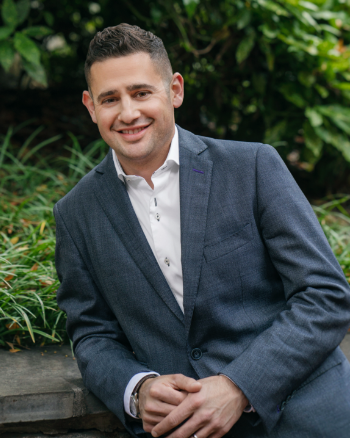Even though he grew up in the business, Alexander G. Assaley, III, AIF®, managing principal at AFS 401(k) Retirement Services, had no idea he’d end up working in financial services. Today, the Maryland-based advisor—who’s been with Commonwealth since 2006—has nurtured a thriving business that’s focused on making complex retirement plans accessible and simple for employers and their employees. Alex is a member of the National Association of Plan Advisors (NAPA) and its parent organization, the American Retirement Association (ARA), the financial services industry’s national association geared toward retirement-focused advisors and industry professionals. He currently serves as president of the association and sits on its leadership council.

Alexander G. Assaley, III, AIF®, with Commonwealth since 2006
With his belief that everyday working Americans need help understanding and planning for their entire financial picture, Alex and his team created MoneyNav, a self-guided platform that provides access to reliable, valuable, and down-to-earth educational resources for pursuing financial independence for today, tomorrow, and the long-term future.
In addition to cultivating this niche market for his firm, Alex and his team have cemented a process for finding and nurturing next-generation talent in the financial services space—something that has vexed other advisory firms.
To make this happen, Alex takes the advice he shares with the American workers served by the 401(k) plans he manages: it’s all about making deliberate, informed choices, following a plan, and inspecting what you expect. In our Q&A, Alex details the core values that drive him and the success of both his business and clients alike.
Q: How did you come into the retirement plan space?
A: Nearly any advisor who specializes in retirement plan consulting would say they got into this space seemingly by accident. But there were certain components of the work that were unique and specialized to retirement plan consulting that continued to draw them in as they learned about the business.
When I met my business partner, Alp Atabek, he had a great individual financial planning and investment management practice as well as a few retirement plans. Alp had the incredible foresight to know that it was difficult, if not impossible, to be a really great advisor to individuals and families and to also focus on retirement plan consulting. I think to really specialize and deliver the type of service offering we’ve created, you need that focus because the service models are very different and, I believe, more labor intensive within the retirement plan consulting service model.
I spent the first year and a half just trying to learn as much as I could, acquiring every resource possible, and studying the complexities, nuances, and unique opportunities in the retirement plan world. It was a challenging process because it’s a very long sales cycle; it probably took about three to four years before we started to achieve any measurable degree of success. Today, we are fortunate to be one of the top advisory firms in the mid-Atlantic region.*
Q: What does the “sales cycle” look like with an institutional client?
A: We have a number of different sales and marketing initiatives we go through on a continual basis. Having somebody refer an opportunity to us is always a great privilege, but many of our potential client opportunities come from targeted marketing, where we identify companies or organizations we think we could help.
We prioritize content development, and we have two team members focused solely on digital media marketing. We invest in ongoing marketing efforts, such as email marketing campaigns, social media marketing, and video content. We try to continually build and grow a pipeline of potential client opportunities, knowing that the time from the initial meeting to forming a new client relationship is going to be anywhere from six months to two years or so, sometimes longer.
Q: You’re passionate about educating workers about their financial picture. How have you been able to help employers and employees?
A: Most people just haven’t had the opportunity to build strong financial knowledge or financial literacy. Talking about money is still somewhat of a taboo subject, so a lot of people go into college or start their careers without understanding the basic tenets of personal finance.
What’s amazing about the retirement plan industry and the 401(k) space is they are the most native environments for building financial know-how for people. It’s a benefit that’s being offered to employees and their retirement plans within the workplace, so it gives advisors a platform to deliver aspirational financial education and guidance. And we’re able to do this as independent advisors and fiduciaries acting in the best interest of these employees.
Most people know it’s important to save for retirement. But retirement could be 10 years away or 35 years away, and other things are going to happen in our lives between now and that day that are more important. The vast majority of the help we’re delivering for people is how to build this foundational knowledge around money. We’re giving them a road map to pursue the goals they have today to build financial independence for tomorrow.
Q: Tell us about MoneyNav—your unique platform and service. How did you come up with it, and how are the employees served by your retirement plan services using it?
A: As we surveyed the marketplace, we saw that there wasn’t a great single solution to help provide the financial tools, resources, and accountability that people needed. We analyzed and used our findings to come up with the genesis of MoneyNav.
MoneyNav is a wellness platform, dashboard, and educational guide for a user’s entire financial life, where they can get information through different types of content, blog posts, videos, and infographics.
What’s amazing about the retirement plan industry and the 401(k) space is they are the most native environments for building financial know-how for people.
Alex Assaley
Personally, I don’t think technology alone is the solution. MoneyNav is about the combination of meeting somebody where they are with customized, meaningful content that’s curated by independent advisors and giving them the opportunity to make connections and talk to someone about the most important areas of their financial life. So, we’re huge believers that financial guidance and advice in the workplace are driven by advisors.
Q: Something you and your firm have done exceptionally well is recruit, train, and retain young talent. Why do you think the financial services industry struggles with this?
A: There’s no question that our industry needs to do a better job with cultivating young talent and bringing young professionals into the industry. I think that the younger generation strives to find careers where they’re helping people, but they’ve been told financial advisors are primarily working with people who are wealthy and have significant assets. So, for a lot of younger professionals and students coming out of school, that’s a little bit of a turnoff.
When I started, it was still that old school business environment; when people thought about financial services, they thought, “Yeah I definitely don’t want to do that—it sounds cutthroat and evil.” The reality is that, on a daily basis, we’re helping average working individuals and families make smarter decisions when it comes to their money. And we’ve tried to tell that story as we recruit, as we go to different career fairs, and as we talk to students. It’s important to help them understand that the landscape of financial services is broader and more diverse than just being a financial advisor.
Q: What kind of support do you think younger advisors need from their partner firm or from your firm? How do you set them up for success?
A: Historically, in our industry, it’s been simplified to if you want to be an advisor, you need to join a firm, get licensed, and then start trying to build a client base, which has always had a really high rate of failure. With the evolution of technology, that model has become incredibly difficult, if not impossible. It also inadvertently pushes out a lot of great people from this industry into other industries.
Ultimately, building a program in which somebody can take their own natural characteristics and skill sets, then have the opportunity to improve their knowledge and expertise, is integral as the financial services industry continues to evolve and mature. The biggest challenge for advisory firms is having the tools and resources to create a training program, support system, and the runway for a career path.
Q: How else can more established firms recruit for younger talent, so they have a succession plan for the future?
A: As we’ve grown, we’ve spent time as a team defining and refining our culture and what’s important to us as a full team endeavor. It’s about allowing everybody to have a voice and buy-in because that’s what creates an environment where you’re going to attract people who believe in your work.
Sharing that mission, vision, and culture continuously in these different networks and in the community is key. And as we think about bringing on new team members, we’re able to help them understand that our culture is really important. It takes time, energy, and resources.
Q: How do you connect your business to your values in a way that’s meaningful for your team?
A: The beauty of the work we do is that on a regular basis, you can really impact somebody’s life. And, in many cases, this happens in different ways than what you’d expect. Over the years, we do this internal exercise that we call our “proudest moments,” where we have everybody on the team create a one-page summary of their proudest moment of working at AFS. Then, we share what we wrote with each other. What’s profound is that in nearly every instance, the foundation of that proudest moment is not about financial services, 401(k)s, or money. It’s about human connection and helping somebody achieve something that’s important to them.
*401k Specialist: Top Advisor By Participant Outcomes (TAPO): Nominations were solicited by 401(k) Specialist magazine. Advisors respond to a series of questions, and one advisor is chosen by panel to be profiled each month. Individuals were selected solely based on the subjective opinions of 401(k) Specialist’s panel, and selection is not indicative of the advisor’s future performance. Your experience may vary. For more information, please visit here.


